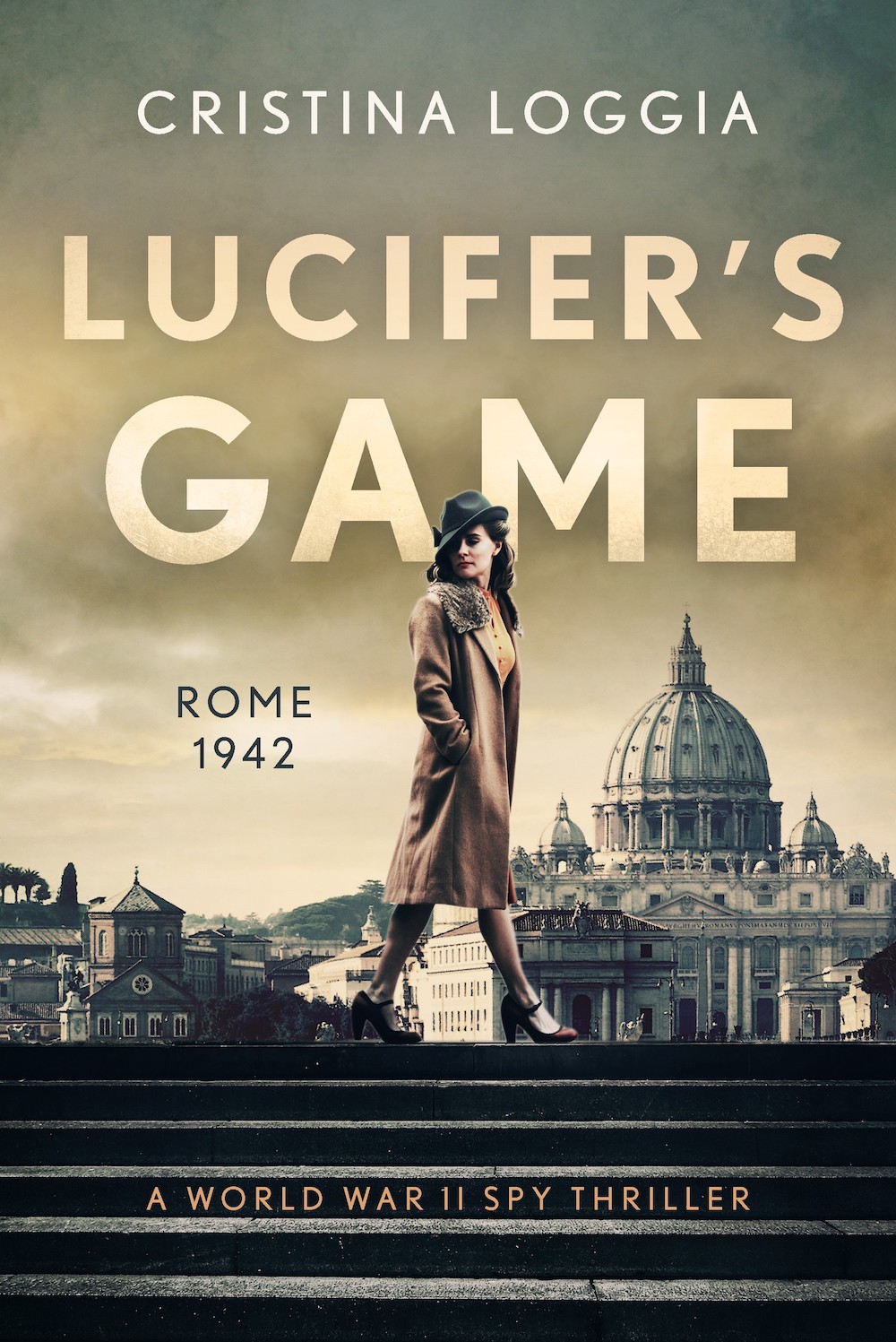Published March 27th, 2023
Interview
by Asmi Aggarwal
In this interview conducted in written format, I had the chance of conversing with, Cristina Loggia, author of the spy thriller Lucifer's Game (2021). We delved into the intricacies of her writing process and the challenges encountered by her as she set out to write in a language not native to her, from the perspective of a female protagonist, while taking inspiration from the people around her, and drawing from her own rich history, culture, and heritage.
Cristina Loggia started her career as a newspaper reporter for L’Eco di Biella and La Provincia di Biella, in Piedmont, Italy. Later, she ran the press office of an MP, shortly before moving to London where she worked for several years as a public affairs and media relations professional. Cristina has a Ph.D. in English Literature and Foreign Languages from the Catholic University of Milan vouching for her passion towards reading and writing which culminated in the creation of Lucifer’s Game, her first novel. The author is also a member of The Society of Authors, The Crime Writers’ Association, and The Historical Writers’ Association.
Asmi Aggarwal: What compelled you to draft your first book around World War 2?
Cristina Loggia: I have been passionate about World War 2 since my childhood. I heard countless stories told by eyewitnesses of this terrible conflict. My paternal grandfather Guido was arrested by the Germans and deported to Stalag III, a concentration camp in Berlin. After lunch, usually on Sundays, still sitting at the table, he told us children the story of his escape from that camp and his three-month long adventurous return home through Poland and other eastern European countries. I still recall as if it was today the stupefaction I felt at hearing him talk. My maternal grandfather Renzo chronicled similarly dramatic accounts that happened to him and others he knew, including how he was thrown in jail for buying goods on the black market. Even my dad, despite being a small child at the time, still vividly remembers a Wehrmacht contingent stopping at his farm for a few days on its retreat home to Germany in 1945.

Over the years I read many books about World War 2. I came across a very interesting account which mentioned that there were a number of English spies operating in Benito Mussolini’s Fascist Italy. I combined this initial idea with all I knew from an historical perspective and the memories of my family to write Lucifer’s Game.
Asmi: Is there, perhaps, a story behind choosing Italy as a setting for the thriller — any history that compelled the creation of this page-turner?
Cristina: I chose Italy, as a location of my fictional novel, because it had been a geopolitically pivotal country during the Second World War, and the simple fact that Churchill famously described it as the “soft underbelly of the Axis” was indeed quite significant. Crucially I came across documents that showed how a British spy operating in Mussolini’s Fascist regime, at some point in 1942, received a message: his HQ in London sent him congratulations for accomplishing his mission of heavily damaging the advance of German Field Marshal Erwin Rommell and his formidable Afrika Korps in North Africa. It’s worth remembering that if The Desert Fox — as Rommel came to be known for his daring manoeuvres — had defeated the Allies in that theatre of war, it would have been an absolute catastrophe: by conquering Egypt, the Third Reich would have reached the strategically important oil fields of the Middle East. War, in those days, was fuelled, quite literally, by troops on tanks and trucks. I couldn’t stop thinking about how that spy managed to achieve that. Did he do it alone or did he receive help from others? And who could those be? Italy presented the wonderful opportunity to highlight the role of the Church, the story of the Italian Jews and adopt a fascinating city like Rome, which I know well, as a setting.
Asmi: How did you manage to preserve your own identity, language and culture while writing in a foreign language?
Cristina: I never felt that my identity, native language and culture have been in any way under threat of being lost, not by writing in a foreign language nor by any other means. In fact, knowing both languages allowed me to compare and elect how best to portray concepts. I guess that there will always be an element of my being Italian in my writing, as the richness of expression of this language can’t be taken away and will always be found in how I write. It’s ingrained in who I am. But at the same time, by showing that things can be expressed in a slightly different way, offer the reader the opportunity to appreciate there is an additional perspective that could and should be considered. Words are exceptional vehicles!
Asmi: Did you encounter any particular challenges while writing in English and do you believe that the language hindered you from expressing your thoughts and ideas in a more original manner compared to your native Italian?

Cristina: I speak, write and even dream in English, every day, so it’s become second nature to me to express myself in this language. Rather than a challenge, I saw writing in a non-native language as an opportunity to research words and expressions that I would not normally use. Certainly, it hasn’t been easy, but it wouldn’t have been had I chosen to write in Italian. Writing is an intense process in any language, at least for me. Having said that, it took me a bit longer as I had to think harder. Since Italian has a richer vocabulary compared to English, it allows Italian writers to use more convoluted ways to express themselves, which is perfectly acceptable in that language. Choosing English as the language in which I wrote my novel in a way forced me to think more efficiently: English has an immediacy that Italian doesn’t always have, and especially for a thriller this is a huge bonus. On the other hand, there is no doubt that writing in a not native language prevents from using ways to express thoughts that would come naturally in a native language. But I don’t believe that the originality of an idea is in any way limited by the language in which it is expressed. There will always be several ways to write, and many versions of the same story could be produced by different individuals. It is down to the individual to be original, as I see the language as a means to an end. A good story always transcends borders and will be loved by many, no matter in which language it has been written.
Asmi: You worked as a newspaper reporter. How do you think this experience might have helped set a tone for the novel, especially in terms of the research that went into it?
Cristina: I suppose that coming from a journalistic background helped me to develop a writing style that translates into what I call transparent prose. I wanted to write in an accessible way, so that people would not struggle to understand, because I wanted the story to be at centre-stage, rather than my writing — which I see as a means to an end, a tool to convey an imaginary world. As a journalist you are always required to check facts accurately before writing a piece, and that approach helped me to dedicate a good chunk of time to research, not only to make sure that the historical background was accurately portrayed, but also that the story would feel much more authentic and realistic, despite being entirely fictional. In terms of research, I did most of it before starting to write my novel, but having said that, research was ongoing as I wrote because something you don’t know or need always pops up. For instance, you may have a character owning a car: which car? Which model? What types of automobiles were available in Italy back in 1942? Did they have petrol available or were there shortages? What did they use as fuel? Information that you could or would not be able to foresee as necessary to add in your book!
Asmi: Did you ever have to deal with writer’s block and how did you manage to overcome it?
Cristina: I accepted that, as in every aspect of your life, you have bad days and good days. As a writer, a bad day means you don’t achieve your planned daily word-count or that you delete most of what you wrote the previous day and start again, or simply you can’t come up with anything good enough. Instead of looking at such setbacks as annoying or feel I came to a hard stop, I moved on and avoided to let negativity stifle creativity – which can happen if you focus on failures too much! As Scarlet O’Hara famously said: “tomorrow is another day.” To me, it translates into a more practical piece of advice: look ahead and carry on.

Asmi: The characters you created are realistically flawed and well-rounded; do you find yourself seeing a part of someone real in them, someone that inspired these characters to be written into pages?
Cristina: One of the main characters is based on somebody who actually existed. But I gave him a fictional personality — probably I made him even worse than what he really was! All the others are completely fictional, although, partly, I was inspired by the personality and behaviour of some real, contemporary people I have come across. What was important for me in creating those characters was to show that people do what they do not only because of the circumstances they find themselves in, but also because of who they are, what they think, what they believe it’s wright or wrong and how far they are prepared to go to achieve their goals. I wanted to show not only that nobody is perfect, but also that not all the bad people are on one side and all the good ones on the other. Evil sits on both sides of the fence, not all is as black and white as we think.
Asmi: How was your experience writing from the perspective of a female character — level-headed and strong, in a genre usually dominated by male main characters?
Cristina: I found the idea of having a female protagonist intriguing for many reasons. Women are hardly depicted as having had a proactive role during the war, but in fact many of them had been deployed as secret agents in enemy territory, as well as in their own country. Women also faced many challenges on the home front, as their husbands, sons and fiancés had been drafted in the army and they were left alone to fend for themselves. Life was hard for everybody, and everybody showed courage and determination — women as well as men. My protagonist, Cordelia is one of those women. It was easier for me to imagine what she faced, being a woman myself. Besides, not many women are the main character of a spy novel! So, I created one that was.
Asmi: The love story following the thriller aspects in the novel is quite well-integrated and written. What were some challenges you found yourself facing while trying to balance the two?
Cristina: I tried to make sure that the love story, although quite important to how certain events pan out, was not overshadowing the spy story. I gave Cordelia and Schaeffer enough space for the reader to examine their motivations, understand the background of their love story and how sentiments can influence actions, without making it centre-stage. The love story is a way to showcase the humanity in people, which no one can really escape even in the most extreme circumstances. When I finished writing Lucifer’s Game I wondered in fact if this element was too strongly featured, but in the end I decided to keep it as I wrote it. I liked it, hoping that my readers would as well!
Nationality: Indian
First Language(s): Hindi
Second Language(s):
English
Supported by:

